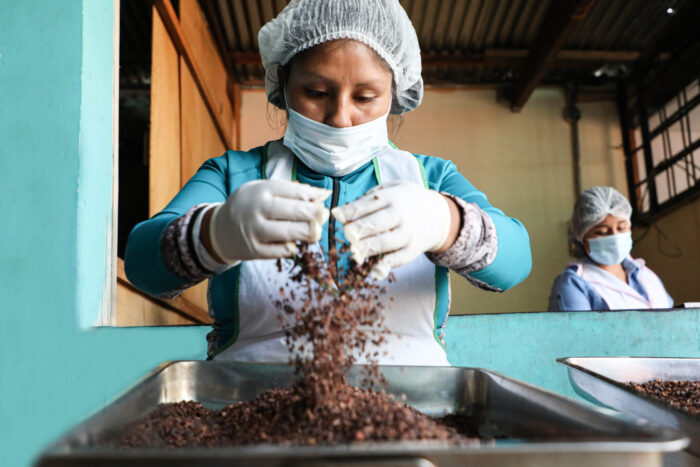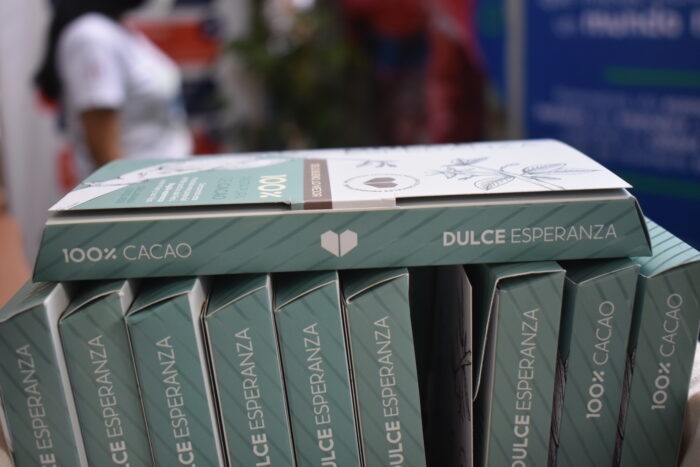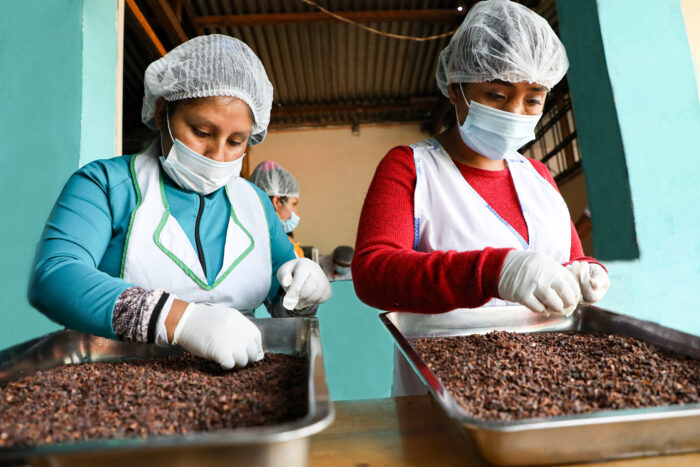 “We are mothers, we are daughters, and we are human beings” proclaimed Roxana, a proud member of the Dulce Esperanza chocolate producing women’s group in Quillabamba, Peru. Roxana is also an inmate at the women’s penitentiary of Quillabamba serving a 10-year sentence. In fact, all 40 members of Dulce Esperanza are prisoners at the women’s penitentiary. Most of these women come from poor communities and committed the crime of transporting cocaine from the countryside to the city—some unknowingly—and in general, in exchange for very little money. Many of them are now serving over 10-year sentences for their crimes. The women’s penitentiary in Quillabamba supported the inmates in starting the Dulce Esperanza group to produce chocolate and make handicrafts to generate income for their children while they are incarcerated. The women of Dulce Esperanza group have great potential to professionalize and expand their business but needed additional training, and this is where NCBA CLUSA’s Creating an Environment for Cooperative Expansion (CECE) project came in.
“We are mothers, we are daughters, and we are human beings” proclaimed Roxana, a proud member of the Dulce Esperanza chocolate producing women’s group in Quillabamba, Peru. Roxana is also an inmate at the women’s penitentiary of Quillabamba serving a 10-year sentence. In fact, all 40 members of Dulce Esperanza are prisoners at the women’s penitentiary. Most of these women come from poor communities and committed the crime of transporting cocaine from the countryside to the city—some unknowingly—and in general, in exchange for very little money. Many of them are now serving over 10-year sentences for their crimes. The women’s penitentiary in Quillabamba supported the inmates in starting the Dulce Esperanza group to produce chocolate and make handicrafts to generate income for their children while they are incarcerated. The women of Dulce Esperanza group have great potential to professionalize and expand their business but needed additional training, and this is where NCBA CLUSA’s Creating an Environment for Cooperative Expansion (CECE) project came in.
NCBA CLUSA Peru began a partnership with the National Penitentiary Institute (INPE) earlier this year to provide the Dulce Esperanza Women’s group with tailored Coop Marketing School courses on the cooperative model and other business and financial management topics. The classes kicked off in August; At the inauguration event, the Director of the Prison and the National Commission for Development and Life without Drugs (DEVIDA) coordinator in Quillabamba provided their words of encouragement and support.
CECE’s cooperative finance consultant, Gabriella Vizcarra, began the series by training the Dulce Esperanza women’s group in financial management basics. The objective of this first course was for the women to learn how to better administer their finances, avoid debt, and develop a culture of saving to improve quality of life. In addition to understanding how to manage personal finances, the course was also designed to provide tools for the Dulce Esperanza women to grow their business and continue to provide financial support to their families outside the prison walls.
CECE’s licensed counselor consultant Luis Quispe also participated in the training and talked about the psychological impulses of spending. He explained to the women how every decision that they make with the money they earn can either benefit or harm their future; therefore, developing financial awareness and a culture of saving is critical.
 In addition to the financial management course NCBA CLUSA also helped the women’s group sell their chocolates at the 2021 FICAFÉ international coffee fair, which was serendipitously hosted in Quillabamba from October 28-31, 2021. The CECE project helped the women prepare their packaging and also helped them establish an agreement with a partner in Cusco that can sell their products on a regular basis.
In addition to the financial management course NCBA CLUSA also helped the women’s group sell their chocolates at the 2021 FICAFÉ international coffee fair, which was serendipitously hosted in Quillabamba from October 28-31, 2021. The CECE project helped the women prepare their packaging and also helped them establish an agreement with a partner in Cusco that can sell their products on a regular basis.
Moving forward, Dulce Esperanza would like to become a formal cooperative. NCBA CLUSA, DEVIDA, INPE, and PRODUCE have established a working group to analyze the legal feasibility of forming a coop of incarcerated people. The group will develop a workplan for 2022 to formalize the cooperative and to potentially expand this women’s cooperative initiative to other prisons as well. Through the Coop Marketing School, which was established with PRODUCE and DEVIDA support, the CECE project will also continue to train the Dulce Esperanza women’s group on branding, packaging design, marketing, and cooperative management topics so the women can market their products to a wider audience outside the prison.
Prison culture can dehumanize people, but through its Productive Prisons Program, INPE has worked hard to preserve the humanity of their inmates and ensure they can be productive members of society even while incarcerated. Dulce Esperanza has allowed the women of Quillabamba Penitentiary to harness their entrepreneurial spirit and skills and highlight their identities as mothers supporting their children. Now, through the US Agency for International Development (USAID) Cooperative Development Program (CDP)-funded CECE project, they are also pursuing the opportunity to become cooperative business owners and members.
 As expressed by Milagros, another member of Dulce Esperanza and inmate of the Quillabamba penitentiary, “I want to say thank you on behalf of all my companions for the courses you have taught – we are eternally grateful, and, in this way, we can become empowered women that can move forward. We hope that this is not the last but that these courses will continue”.
As expressed by Milagros, another member of Dulce Esperanza and inmate of the Quillabamba penitentiary, “I want to say thank you on behalf of all my companions for the courses you have taught – we are eternally grateful, and, in this way, we can become empowered women that can move forward. We hope that this is not the last but that these courses will continue”.


